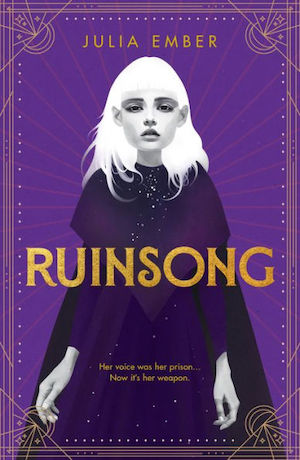Julia Ember’s Ruinsong isn’t quite the novel I thought it’d be. The cover copy gave me to expect more court intrigue, but that may be a function of having read far more non-YA than YA novels—and Ruinsong is very much a YA novel in the mode of find your inner moral strength and overthrow tyranny while falling in love. This is an excellent mode when well-done, and Ruinsong does it rather well indeed.
As an aside: I do understand, from a marketing and category-labelling perspective, why cover copy uses such phrases as “LGBTQ+ romantic fantasy”—and while I suppose it is possible to be or have been all of L, G, B, and T during one’s life—but I have this terrible tendency to break out into unhelpful laughter when “LGBTQ+” is immediately paired with “two women.” (Or “two men,” for that matter.) I feel like we’re definitely always leaving someone out here.
In a country ruled by a usurper queen—a mage with a grudge against the nobility, who compels them yearly to attend events where they are tortured en masse—two young women have grown to near adulthood. Cadence and Remi were fast friends as young children, despite differences in class: Cadence an orphan whose only hope of security was to find a patron, Remi the daughter of a wealthy noble family. They haven’t seen each other in years. Remi’s family avoids the capital as much as possible, while Cadence was hand-picked by the queen to become one of her most important tools.
Buy the Book


Ruinsong
Cadence, you see, is a mage—a powerful one, with the ability to affect people’s bodies. Her powers can be used to heal or to harm, and as Ruinsong opens, she is being pressured into being the queen’s torturer—to inflict pain and suffering through the power of her magic on the gathered nobility. Cadence is isolated, the victim of years of careful grooming, and given a stark choice between her own comfort and survival and acts that she knows to be wrong. (Even pointlessly wrong.)
It’s at this torture event—the Performance—that Remi sees Cadence again for the first time in years. Cadence has no knowledge that Remi is one of the many on whom she inflicts pain that night: their meeting comes later, by coincidence, when Remi is visiting a hospital and finds Cadence illicitly healing a young man whose injuries were inflicted by the queen’s most trusted—and most vicious—officer.
Remi is a potential vulnerability for Cadence. One the queen may seize on to manipulate Cadence’s inconvenient conscience, for Cadence is too useful a tool to kill out of hand—but kill everything she cares about? The queen can do that. And with Remi’s family implicated in resistance to the queen’s rule, she has plenty of leverage over Remi herself. As the two girls develop—or acknowledge—feelings for each other, they have to face an impossible situation: the queen must fall. Or they will die.
Ember’s prose is smooth and efficient, and her viewpoint characters are believable, compelling individuals—all the more believable for being occasionally annoying. I could wish, though, for a little more depth of worldbuilding, and for antagonists whose primary motivations appear to lie solely in spite, ambition, and cruelty for cruelty’s sake. We have had, in the last several years, more than enough evidence from the real world that spite and ambition can indeed be some people’s only motivation: but it remains less than entirely interesting to watch. I prefer antagonists who, if they are cruel, use cruelty for a point, or in consequence of their cultural beliefs, rather than as an end in itself: antagonists whose goals and methods have merits I can at least see from their perspective, even if I disagree wholeheartedly with them.
But this is a minor cavil, especially for a novel whose final arc leans in to romance as much as coming of age. The queen is as much external inimical force as human antagonist, a force that compels Remi and Cadence to face their fears and claim their own power. Ruinsong, despite my sometime grumbling, is compelling: I read it in a single three-hour sitting, and I do look forward to seeing more of Ember’s work in future.
What are you all reading lately?
Read an excerpt from Ruinsong here.
Liz Bourke is a cranky queer person who reads books. She holds a Ph.D in Classics from Trinity College, Dublin. Her first book, Sleeping With Monsters, a collection of reviews and criticism, was published in 2017 by Aqueduct Press. It was a finalist for the 2018 Locus Awards and was nominated for a 2018 Hugo Award in Best Related Work. She was a finalist for the inaugural 2020 Ignyte Critic Award, and has also been a finalist for the BSFA nonfiction award. Find her on Twitter. She supports the work of the Irish Refugee Council, the Transgender Equality Network Ireland, and the Abortion Rights Campaign.










